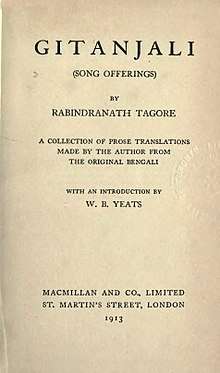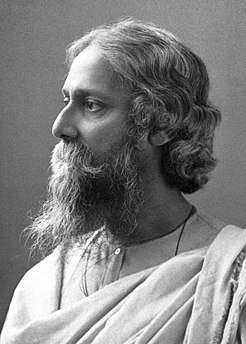Gitanjali
 Gitanjali title page | |
| Author |
|
|---|---|
| Original title | গীতাঞ্জলি |
| Country | British Raj |
| Language | Bengali, English |
| Subject | Devotion to God |
| Genre | Poem |
| Publisher | Macmillan and Company |
Publication date | 1910 |
Published in English | 1912 |
| Pages | 104 |
Gitanjali (Bengali: গীতাঞ্জলি, lit. ''Song offering'') is a collection of poems by the Bengali poet Rabindranath Tagore. Tagore received the Nobel Prize for Literature, largely for the book. And is part of the Collection from the UNESCO of Representative Works.
History
The original Bengali collection of 156/157 poems was published on August 14, 1910. The English Gitanjali or Song Offerings is a collection of 103 English poems of Tagore's own English translations of his Bengali poems first published in November 1912 by the India Society of London. It contained translations of 53 poems from the original Bengali Gitanjali, as well as 50 other poems which were from his drama Achalayatan and eight other books of poetry — mainly Gitimalya (17 poems), Naivedya (15 poems) and Kheya (11 poems).[1]
The translations were often radical, leaving out or altering large chunks of the poem and in one instance fusing two separate poems (song 95, which unifies songs 89,90 of Naivedya). Tagore undertook the translations prior to a visit to England in 1912, where the poems were extremely well received. In 1913, Tagore became the first non-European to win the Nobel Prize for Literature, largely for the English Gitanjali.[2]
The English Gitanjali became popular in the West, and was widely translated.[3] The word gitanjali is composed from "geet", song, and "anjali", offering, and thus means – "An offering of songs"; but the word for offering, anjali, has a strong devotional connotation, so the title may also be interpreted as "prayer offering of song".[3]
William Butler Yeats wrote the introduction to the first edition of Gitanjali.[4]
References
- ↑ Ghosal, Sukriti. "The Language of Gitanjali: the Paradoxical Matrix" (PDF). The Criterion: An International Journal in English. Retrieved 14 August 2012.
- ↑ books.google.de, Sukriti. "Gitanjali: Song Offerings". Retrieved 8 April 2017.
- 1 2 Gitanjali: Selected Poems (2010-07-30). "Gitanjali: Selected Poems". School of Wisdom. Archived from the original on 2012-07-21. Retrieved 2012-07-11.
- ↑ "Yeats' introduction to Tagore's Gitanji". The Fortnightly Review. 2013-05-27. Retrieved 2017-12-21.
External links
| Wikimedia Commons has media related to Gitanjali. |
| Wikisource has original text related to this article: |
| Bengali Wikisource has original text related to this article: |
- Gitanjali (Song Offerings)
- Gitanjali

.
